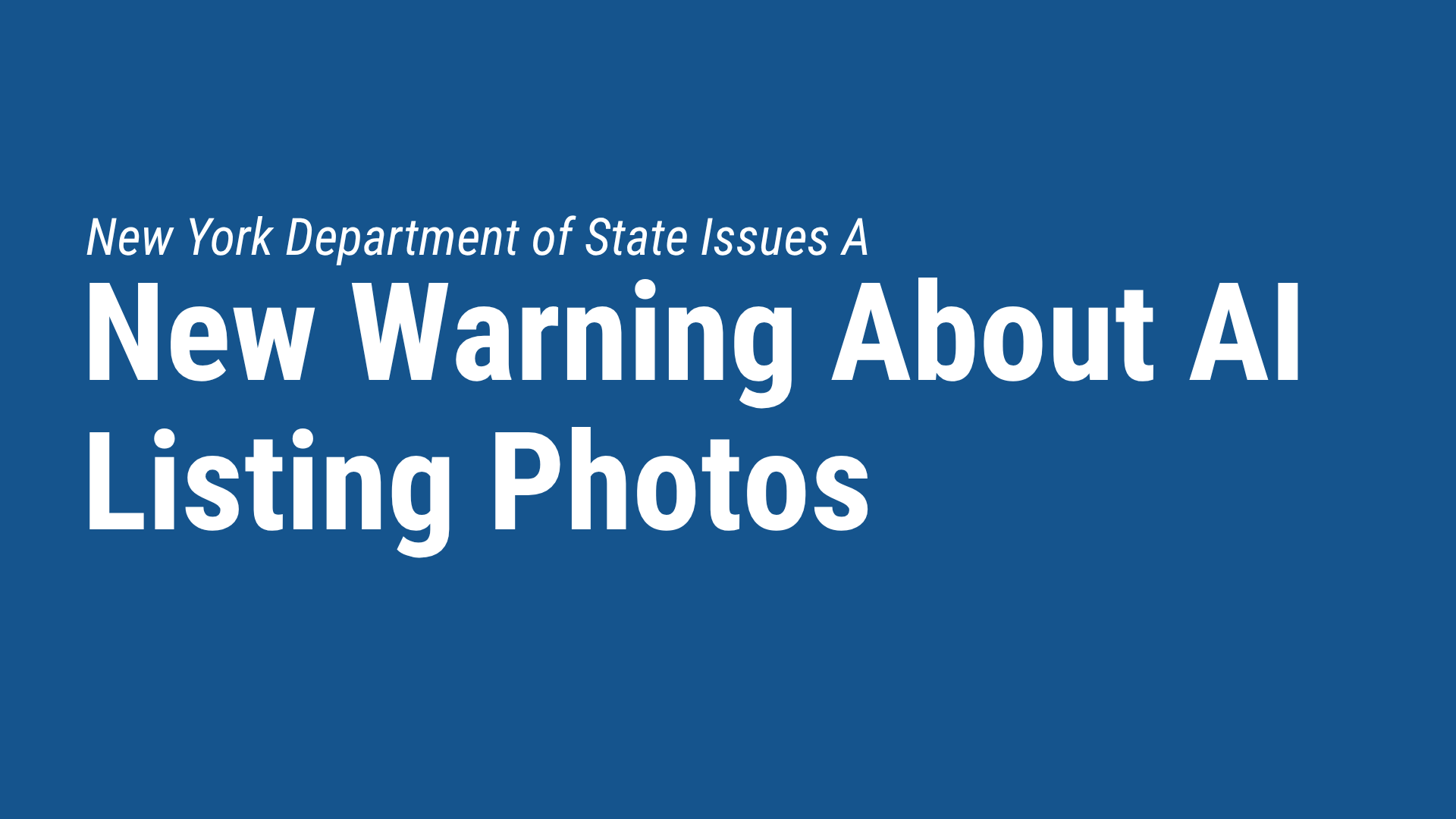New York Warns About AI Listing Photos: What Buyers and Agents Should Pay Attention To
New York’s Department of State released a public warning about the growing use of AI-generated real estate photos. The alert is short, but it points to concerns about transparency, consumer trust, and how edited images can shape a buyer’s expectations before they walk through the door.
This is the first time a state regulator has spoken directly about AI listing photos in this way, and although the warning is vague, it’s an important moment for buyers, sellers, and real estate professionals.
What New York Said in the Warning
New York explained that AI tools are now producing listing images that may not reflect the true condition of a property. The state reminded real estate licensees that:
- Images must be accurate and honest
- Misleading photos can violate advertising rules
- Deceptive advertising can lead to discipline, including monetary penalties
- Buyers should look for signs of digital manipulation
- Consumers may react negatively to photos that appear AI-generated
The alert also encouraged buyers to inspect homes in person and verify details that may not be clear from photos. They also released a short video to accompany their alert.
Questions This Raises for the Real Estate Industry
New York did not define specific criteria for what counts as acceptable editing.
The alert does not get into specifics about virtual staging, nor does it draw lines between basic edits, advanced edits, or fully AI-generated images. In anycase, the warning signals questions about the use of AI in real estate marketing will need answers in the future.
Some concerns include:
- How much editing is acceptable before an image becomes misleading
- Whether AI-assisted images should be labeled
- Whether virtual staging should always be identified, even if a human does the work
- How much enhancement is appropriate when representing a home’s actual condition
- Whether buyers should see at least one unedited reference photo
- How AI may influence expectations at showings
These questions matter because AI tools can brighten lighting or adjust color, but they can also change rooms, surfaces, or features in ways that may give the wrong impression about property condition.
Do Buyers Trust AI-Assisted Marketing?
New York’s alert referenced concerns about consumer perception. There is research that supports those concerns.
A recent peer-reviewed study in the International Journal of Information Management found that many consumers:
- avoid services advertised with AI-generated images
- feel AI-generated images lack “veracity”
- show lower trust when they believe an image is AI-generated
- respond more strongly when the decision is important or high involvement
The study did not examine real estate directly.
However, homebuying is a high-involvement decision, and the research helps explain why concerns over AI-assisted marketing are about more than regulations and red-tape.
“If I had different options, I would choose the service of a company that uses real photos over AI-generated images. It gives me a more accurate idea of the product being offered.” – Respondent from the study (P15; emphasis added).
Study citation:
Belanche, D., Ibáñez-Sánchez, S., Jordán, P., & Matas, S. (2025). Customer reactions to generative AI vs. Real images in high-involvement and hedonic services. International Journal of Information Management, 85, 102954. https://doi.org/10.1016/j.ijinfomgt.2025.102954
Why This Alert Matters
Listing photos shape expectations, and buyers rely on those photos when deciding which homes to dedicate their time going to see in person.
The warning from The New York Department of State may also indicate that more states will begin evaluating how AI appears in listings and other types of real estate marketing.
Possible future steps could include:
- labeling requirements
- clearer MLS categories for photo types
- rules for identifying virtual staging
- guidance on acceptable editing
- new expectations for transparency in real estate
For now, New York is urging both agents and consumers to stay alert as AI tools continue to evolve.
Join the Discussion
AI tools are becoming more common in real estate marketing. New York’s warning opens the door for a wider discussion.
Here are a few questions for our community:
- Do buyers want AI-assisted images labeled?
- How should agents present virtual staging?
- What counts as a helpful edit versus a misleading one?
- How should the industry define misleading representation?
We will continue monitoring updates and sharing insights as more states address this topic. For now, share your thoughts in the comments or in our Facebook Group.
About the Author
Katt Wagner is the Head of Content and Community at EZ Real Estate Platform, where she helps agents and brokers lead with transparency and thrive in the increasingly prop tech driven real estate landscape. Her work not only supports agents – it helps deliver a better, more transparent experience for today’s buyers and sellers.
Explore EZ Real Estate Platform
EZ Platform Reviews
EZ Agent Mastermind (Facebook Community)
Note: The opinions, suggestions, and recommendations in this article are for informational purposes only and do not constitute legal advice. Always consult your broker, compliance team, or qualified legal counsel in your jurisdiction before making decisions related to disclosure practices, MLS policy, or regulatory compliance.





